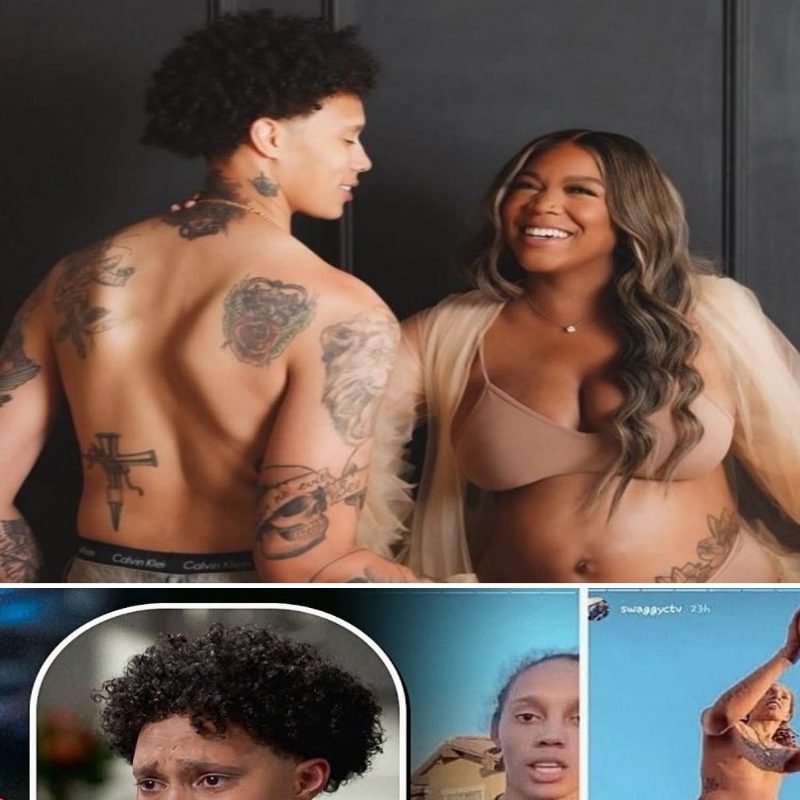Brittney Griner has always embraced the spotlight, thriving under pressure. Yet this week has brought unprecedented turmoil for the WNBA star. What began as a routine on-court clash with rising star Caitlin Clark has exploded into a viral controversy filled with rumors, accusations, and conspiracy theories threatening to overshadow the sport itself.

The Day Everything Changed
It started like any other intense WNBA game—physical play, heated words, and classic rivalry tension. Griner, often a lightning rod for drama, got into a heated exchange with Clark. To most, it seemed like standard competition. But then, a grainy video surfaced online that changed everything.
Viewers and online lip-readers claimed they heard Griner call Clark “trash” and shockingly, a “f***ing white girl.” The clip went viral within hours, sparking fierce debate. Was this just competitive trash talk or something more serious? And why was the league seemingly silent about one of its biggest stars?
Silence Sparks Speculation and Social Media Firestorm
Despite millions seeing the video, Griner offered no comment—no denial, no explanation, not even a cryptic post. Her silence only fueled more speculation. “If accused of racism, wouldn’t you defend yourself immediately?” critics asked. Instead, Griner remained quiet, intensifying suspicion.
Social media erupted as fans, critics, and fellow athletes weighed in. Riley Gaines, outspoken in women’s sports circles, shared the clip, condemning both Griner’s words and the league’s lack of response. The tension grew as every moment passed without clarity from Griner or the WNBA.
An Unexpected Twist
Just as the controversy seemed to reach its peak, the focus shifted. The internet uncovered older footage from Griner’s Instagram, sparking a fresh wave of rumors—not about words, but about Griner’s gender identity.
A topless video, allegedly posted by Griner years ago, raised eyebrows since it remained visible despite Instagram’s strict nudity rules for women. Speculation exploded: Did Instagram’s AI classify Griner differently? Was there more to her identity than publicly known?
Rumors, Theories, and Gender Debates
The rumors multiplied. Some claimed Griner was a biological male raised female, others suggested she was intersex with male-typical traits. Some proposed she was a transgender woman on hormone therapy, raising questions about fairness in women’s sports competition.
The debate quickly moved beyond basketball, entering cultural battlegrounds. “If the WNBA is hiding an athlete with biological advantages competing against cisgender women, that’s not just identity—it’s cheating,” argued a viral post.
For many, this was about more than Griner—it was about transparency, fairness, and protecting the integrity of women’s sports.
WNBA’s Silence Is Deafening
Through the turmoil, the league has remained mostly silent. No official statements or investigations have been announced. For a league that champions inclusion and fairness, this silence has been deafening.
Fans are demanding answers. “The WNBA owes female athletes a thorough investigation—not vague statements, but full transparency,” said one commentator. “If even part of these rumors is true, it’s a serious issue.”
The Larger Picture: Identity, Fairness, and the Future of Women’s Sports
The Griner controversy reveals deeper tensions in sports and society. On one side, people argue that inclusion and identity must not compromise fairness and openness. On the other, critics say scrutinizing Griner’s identity is invasive and rooted in bias.
Meanwhile, rookie sensation Caitlin Clark finds herself caught in the middle. Supporters rally around her, flooding social media with encouragement. The phrase “I’ve got the Clark Effect” is trending among Indiana Fever fans pushing back against perceived league bias.
What Comes Next?
As the dust settles, the WNBA faces a crucial moment. The questions around Griner won’t fade. To protect its reputation, the league must confront these rumors openly, with honesty and respect.
Should the WNBA launch a formal investigation into Griner’s eligibility? Should it clarify policies on gender and competition? These questions extend beyond the league—they challenge sports and society as a whole.
For now, fans are left uncertain. But one thing is clear: the drama in women’s basketball is far from over.